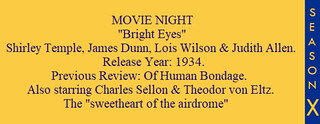
Review #1342: Bright Eyes.
Cast:
Shirley Temple (Shirley Blake), James Dunn (James "Loop" Merritt), Lois Wilson (Mary Blake), Judith Allen (Adele Martin), Charles Sellon (Uncle Ned Smith), Theodor von Eltz (J. Wellington Smythe), Dorothy Christy (Anita Smythe), Jane Withers (Joy Smythe), Brandon Hurst (Higgins), Jane Darwell (Elizabeth Higgins), Walter Johnson (Thomas), and George Irving (Judge Thompson) Directed by David Butler (#1334 - Just Imagine)
Review:
When it comes to needing a charming and good-natured kid presence for a film or two, one can't really go wrong with Shirley Temple. Born in 1928, she had been enrolled at Meglin's Dance School with encouragement from her mother by the time she was three years old, and she was noticed by a producer from Educational Pictures, known for their one-reel comedies in the 1920s and 1930s. In 1934, she was given her first major breakthrough with Stand Up and Cheer!, a musical from Fox Film that served as a vehicle for various actors to sing. In that year alone, she made appearances in nine films (two of them without credit), with this being her last one released (done so on December 28), which happened to be the first one made specifically as a starring vehicle for her, which was written by director Butler and Edwin J. Burke. Her run was a quick but memorable one, starring in at least two films until 1940 while making appearances in thirteen further films before her last in 1949. Her main features were usually made on the cheap, with songs and dances to go alongside sentimental and melodramatic situations, which certainly must've proven to inspire plenty of hope when it comes to escapist fare for Great Depression audiences. In that sense, this proves to be an okay piece to look back upon with the age of nearly 85 years behind it. If one can get behind a kid singing "On the Good Ship Lollipop", one could probably get behind any sort of sugary stuff for 83 minutes. It isn't so much a predictable film as it is just one that will go exactly where it wants to go and nowhere else. Oddly enough, the best parts of the film are usually when Sellon or Withers (who would star in her own kid films) are on screen, delivering a good share of the laughs despite having cranky characterizations. This is especially true for the latter, who was defended by Butler from calls of being cut down by Temple's mother - the contrast between the two is importantly distinct and amusing, right down to one being slapped again and again. Temple carries the film enough, in that one really doesn't need much to go along with a nice kid for a film (barring a lack of personality of course), but she makes the experience worth it in her enthusiasm. Dunn goes along fine, carefully crafted to suit Temple when it comes to being a guardian of the clouds. The rest are here and there, lending help to try and make this fairly predictable tale of spunky kids cheering up old cranks and young people go without trouble. The film received one award for its main star in an Academy Juvenile Award, which was given out to twelve child performers until it was discontinued in 1960. Temple is (and remains) the youngest recipient to be honored by the Academy. The curiosity is fair, and it should prove fine for the young ones looking for some old-fashioned charms like Temple can provide.
Overall, I give it 7 out of 10 stars.

No comments:
Post a Comment